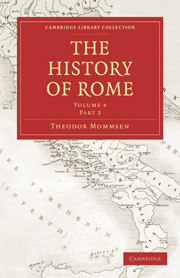CHAPTER XII - RELIGION, CULTURE, LITERATURE, AND ART
Published online by Cambridge University Press: 07 September 2010
Summary
State-religion
In the development of religion and philosophy no new element appeared during this epoch. The Romano Hellenic state-religion and the Stoic state-philosophy inseparably combined with it were not merely a convenient instrument for every government—oligarchy, democracy, or monarchy—but altogether indispensable, because it was just as impossible to construct the state wholly without religious elements as to discover any new state-religion adapted to form a substitute for the old. So the besom of revolution swept doubtless at times very roughly through the cobwebs of the augural bird-lore (P. 296); nevertheless the rotten machine creaking at every joint survived the earthquake which swallowed up the republic itself, and preserved its insipidity and its arrogance without diminution for transference to the new monarchy. As a matter of course, it fell more and more into disfavour with all those who manifested freedom of judgment. Towards the state-religion indeed public opinion maintained an attitude essentially indifferent; it was on all sides recognised as an institution of political convenience, and no one specially troubled himself about it with the exception of political and antiquarian literati. But towards its philosophical sister there gradually sprang up among the unprejudiced public that hostility, which the empty and yet perfidious hypocrisy of set phrases never fails in the long run to awaken. That a presentiment of its own worthlessness began to dawn on the Stoa itself, is shown by its attempt artificially to infuse into itself some fresh spirit in the way of syncretism.
- Type
- Chapter
- Information
- The History of Rome , pp. 559 - 619Publisher: Cambridge University PressPrint publication year: 2010First published in: 1866



